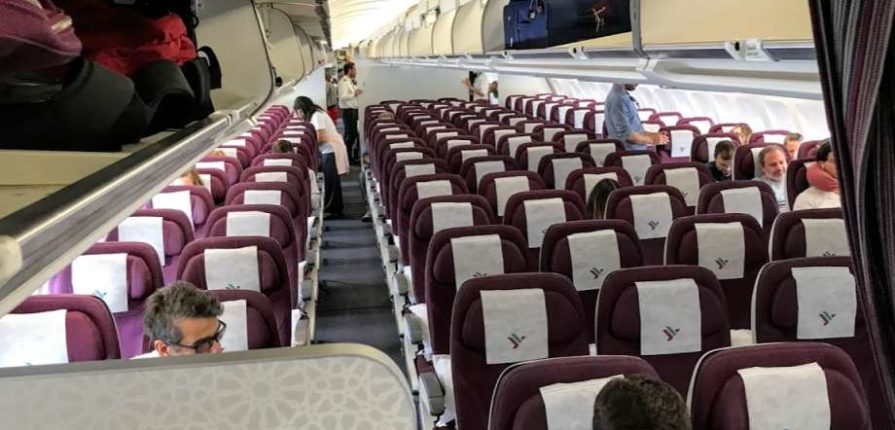One of the key characteristics of a smart or savvy traveler is the ability to adapt to a quickly changing environment, and now more than ever those travel skills are going to come into play.
Traveling in the age of the COVID-19 or coronavirus contagion means that you are going to have to be prepared for big changes on short notice as the travel industry adapts. Just staying at home is one option, but many of us don’t have that choice, or desire. So if you are headed out on the road or in the skies in the next few weeks or months, here’s what you need to know now. But as always, keep in mind that what you’ll read below is likely to change…and change quickly.
1. WAIT AND SEE.
As the coronavirus crisis expands around the world, it’s time to take a “wait and see” approach to travel. If you are not traveling to or from an area where there’s a large outbreak, it’s probably okay to still take that trip, but with a few precautions. Due to the rapidly changing environment, travelers venturing out now should keep in mind that travel plans (especially those involving international travel) could change rapidly, including canceled flights, or worse, quarantines. That means packing enough of essential medications for at least two weeks and leaving your home, family and pets prepared for the possibility of a delayed return. (Think of what happened on the home front of the travelers on cruise ships or in stateside quarantines with trips unexpectedly extended by at least two weeks.) Those with chronic lung conditions or compromised immune systems should not travel at this time.
2. INSURANCE.
Don’t count on travel insurance to bail you out of any financial hits you might take. Most major travel insurers are now busy getting the word out that their policies exclude coverage for epidemics. This applies to policies purchased directly from insurance companies, or indirectly through credit cards. Currently, the only way you can shield yourself from a big financial loss is to purchase much more expensive “cancel for any reason” policies. These cost significantly more (2x) than regular policies, and only partially cover any losses. You could also take a hit financially if you are quarantined or otherwise delayed, and unable to work.
3. BUSINESS TRAVEL.
If you are a business traveler working for a large company, it’s increasingly likely that you have heard (or will soon hear) from your company HR or travel department about bans on international travel, and severe restrictions on domestic trips. I’m hearing from several readers whose companies have banned nearly all travel, called back travelers from current trips, and limited remaining trips to only those deemed business critical. Based on a poll of corporate travel buyers from last week, the Global Business Travel Association says that coronavirus fears could could potentially cost the travel industry $46.6 billion per month or $559.7 billion annually. In the past week, Twitter and Salesforce, two of San Francisco’s largest employers, both with significant travel budgets, have put strict limits on travel.
Big meetings and conventions planned for March or April are seeing a similar road to demise. First, organizers state that they are aware of attendee fears around coronavirus, and they step up communications on how they are taking measures to prevent spread, including bans on handshakes, liberal use of hand sanitizers and stringent cleaning protocols. Then major sponsors or companies sending large contingents to conferences start to cancel, with various “out of an abundance of caution” statements. After enough of them cancel, organizers throw in the towel and cancel or postpone the conference to later in the year.
4. AIRLINE IMPACT.
While the airlines won’t make future-looking statements about advance bookings, it is becoming increasingly clear that they are falling through the floor. To help prop up demand, American Airlines, Alaska Airlines, and JetBlue have said that they will waive change or cancellation fees for domestic flights booked in the next two weeks for trips through early June. It’s important to note restrictions on these waivers, though. First, they only apply to bookings made now through mid-March — they do not apply to tickets purchased before that*. Also, these waivers do not include “get your money back” refunds for canceled trips. Instead, you’ll be issued a flight credit that must be used within one year. Remember, you’ll only get a refund from an airline if it cancels your flight; you will not get one if you decide to cancel your trip. Updates: United copied and expanded on moves by other carriers, with a month long (March 3-31) booking window for domestic and international travel. *On March 9, Delta said it would waive change or cancellation fees on reservations for all March and April flights no matter when they were booked, a much more liberal (and fair) policy that could be adopted by other carriers.
So far, I have not noticed that airlines are resorting to broad and deep discounting to maintain a steady flow of advance bookings. Instead, I think they will soon focus on cutting capacity in order to stem losses. They simply cannot afford to continue to fly routes with passenger loads at less than 25 percent. Currently, we are seeing airlines reduce the number of flights on routes where they have multiple flights per day. If this gets worse, we’ll see airlines begin to cut routes completely. This applies mostly to international flights now, but could soon impact domestic flights if demand continues its rapid slide. One bright side to declining demand: It’s increasingly likely that elite members will snag upgrades, or at least be treated to an empty seat or row in economy class.
Also, while airlines have not drastically cut prices, they are in many cases drastically reducing the number of miles required for redemptions. Jared Kamrwoski, whose Thrifty Traveler website monitors sales on both cash and frequent flyer miles, says that Delta has been aggressively discounting redemptions to Tokyo, with round trips in business class going for a few as 90,000 SkyMiles roundtrip (normally 220,000) and economy class for just 30,000 SkyMiles, (normally 60,000) including travel during the popular Cherry Blossom season in April. UPDATE Mar. 4: Delta has since reduced, but not eliminated, its flight schedules between the US and Japan.
5. MASKS, GLOVES, GELS, WIPES.
Readers are reporting that they are seeing more passengers and flight crew members wearing masks these days. While masks do little to limit the airborne transmission of the disease, most experts are now saying that the primary means of coronavirus transmission is when we touch infected surfaces, and then touch our eyes, nose and mouth. Masks do help remind travelers not to touch their faces, so they could help in that regard. Masks on flight attendants can help prevent the spread of the disease if they are unknowingly infected, too — it can take up to two weeks for symptoms to appear. If you chose to wear a mask, here’s some expert help from the World Health Organization on how to do so safely and effectively.
Air travelers should pack along disinfecting wipes and wipe down everything they might touch in their seat area including: air vent controllers, arm rests, seat belt buckles, video screen controls and window shade handles. In lavatories, cover fingers with tissues or paper towels to open or close doors, turn locks or lift lids.
Many airlines are stepping up regular cleaning of airline cabins, which is a silver lining to this crisis — who doesn’t love a clean plane? Alaska Airlines is asking passengers not to go too far with their own cleaning, stating, “The use of commercially available cleaning wipes on our leather seats can deteriorate the top coat of the leather. The wipe might look dirty, but it’s actually the leather dye color that’s coming off.”
6. MORE PRECAUTIONS.
Other things that travelers frequently touch that are likely harbors of viruses: airport check in, Global Entry or automated passport kiosks, fingerprint ID checks, hotel door handles, escalator hand rails, elevator buttons (touch them with your knuckle or with a key), gasoline pumps, credit card payment terminals and styluses. Use your hand sanitizing gel or wash hands immediately after touching these things, and don’t touch your phone before cleaning your hands. When traveling, clean your phone with an anti-bacterial wipe several times each day.
Pack along a few small bottles of alcohol-based hand sanitizing gel — you don’t want to run out, and it may be tough to find on the road. Bring a supply of tissues, handkerchiefs or bandanas to cover your nose and mouth in case someone near you is sneezing or coughing without covering. Since there is a lot of hand washing going on, pack a small bottle of soap, too, in case you encounter a sink that is out of it. It’s the soap that kills the virus; hot water alone will not do the trick. Also, pack along wet wipes, and be sure that they are disinfecting.
Over the weekend, I noticed that most drug stores, grocery stores and big box discounters had run out of wipes, hand sanitizing gels and other items, but I did find plenty of supplies at local hardware stores.
At this point, it’s still highly unlikely that travelers will become infected with COVID-19 or the coronavirus. Various sources report that infection starts when the virus invades the the throat, making it sore, and bringing on fever and malaise. Then the virus moves into the lungs, causing a dry cough, shortness of breath, and in some cases, pneumonia. If you feel any of these symptoms, quarantine yourself and call a medical professional for guidance.
Source: https://bit.ly/2x8Qrc9





Recent Comments